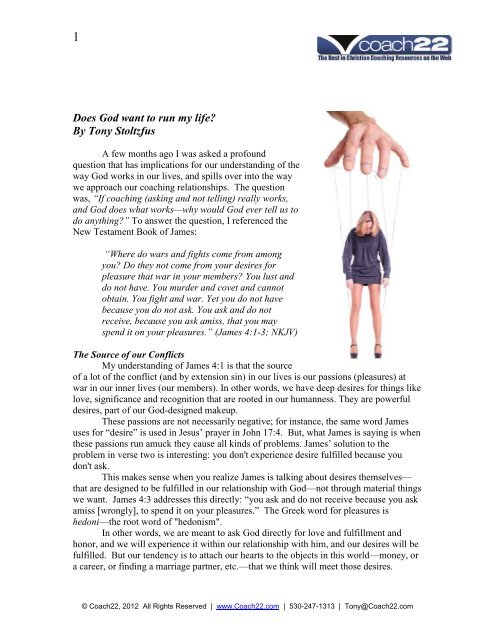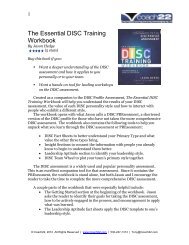Does God want to run my life? By Tony Stoltzfus - Coach22
Does God want to run my life? By Tony Stoltzfus - Coach22
Does God want to run my life? By Tony Stoltzfus - Coach22
Create successful ePaper yourself
Turn your PDF publications into a flip-book with our unique Google optimized e-Paper software.
1<br />
<strong>Does</strong> <strong>God</strong> <strong>want</strong> <strong>to</strong> <strong>run</strong> <strong>my</strong> <strong>life</strong>?<br />
<strong>By</strong> <strong>Tony</strong> S<strong>to</strong>ltzfus<br />
A few months ago I was asked a profound<br />
question that has implications for our understanding of the<br />
way <strong>God</strong> works in our lives, and spills over in<strong>to</strong> the way<br />
we approach our coaching relationships. The question<br />
was, “If coaching (asking and not telling) really works,<br />
and <strong>God</strong> does what works—why would <strong>God</strong> ever tell us <strong>to</strong><br />
do anything?” To answer the question, I referenced the<br />
New Testament Book of James:<br />
“Where do wars and fights come from among<br />
you? Do they not come from your desires for<br />
pleasure that war in your members? You lust and<br />
do not have. You murder and covet and cannot<br />
obtain. You fight and war. Yet you do not have<br />
because you do not ask. You ask and do not<br />
receive, because you ask amiss, that you may<br />
spend it on your pleasures.” (James 4:1-3; NKJV)<br />
The Source of our Conflicts<br />
My understanding of James 4:1 is that the source<br />
of a lot of the conflict (and by extension sin) in our lives is our passions (pleasures) at<br />
war in our inner lives (our members). In other words, we have deep desires for things like<br />
love, significance and recognition that are rooted in our humanness. They are powerful<br />
desires, part of our <strong>God</strong>-designed makeup.<br />
These passions are not necessarily negative; for instance, the same word James<br />
uses for “desire” is used in Jesus’ prayer in John 17:4. But, what James is saying is when<br />
these passions <strong>run</strong> amuck they cause all kinds of problems. James’ solution <strong>to</strong> the<br />
problem in verse two is interesting: you don't experience desire fulfilled because you<br />
don't ask.<br />
This makes sense when you realize James is talking about desires themselves—<br />
that are designed <strong>to</strong> be fulfilled in our relationship with <strong>God</strong>—not through material things<br />
we <strong>want</strong>. James 4:3 addresses this directly: “you ask and do not receive because you ask<br />
amiss [wrongly], <strong>to</strong> spend it on your pleasures.” The Greek word for pleasures is<br />
hedoni—the root word of "hedonism".<br />
In other words, we are meant <strong>to</strong> ask <strong>God</strong> directly for love and fulfillment and<br />
honor, and we will experience it within our relationship with him, and our desires will be<br />
fulfilled. But our tendency is <strong>to</strong> attach our hearts <strong>to</strong> the objects in this world—money, or<br />
a career, or finding a marriage partner, etc.—that we think will meet those desires.<br />
© <strong>Coach22</strong>, 2012 All Rights Reserved | www.<strong>Coach22</strong>.com | 530-247-1313 | <strong>Tony</strong>@<strong>Coach22</strong>.com
2<br />
Instead of praying, "<strong>God</strong>, what do you love about me?" and experiencing his<br />
loving response, we pray, "<strong>God</strong>, if you would just give me the wife you have for me, then<br />
I will be happy." We substitute the created for the crea<strong>to</strong>r—an object we think will fill<br />
our desires but never can—for the true love we can endlessly taste in relationship with<br />
Jesus. To be really blunt, what we often pray is, "<strong>God</strong>, if you will give me this idol then I<br />
will be filled by it and not you."<br />
Letting Go <strong>to</strong> Be Filled<br />
We can't fully experience desire fulfilled in <strong>God</strong> until we let go of the objects in<br />
this world we've latched on<strong>to</strong> in his place. Allegiance <strong>to</strong> him is not about saying, “I am a<br />
worm, <strong>God</strong> just give me your orders and I'll do them." It is a process of opening our<br />
hearts <strong>to</strong> his spirit, allowing him <strong>to</strong> show us the hindrances <strong>to</strong> our relationship with him<br />
(the idols), and then letting go of all those deeply rooted ways that we try <strong>to</strong> get our needs<br />
met through people and things, and finding ways <strong>to</strong> tangibly meet them in relationship<br />
with <strong>God</strong>.<br />
Allegiance means making the fundamental choice that you will find your <strong>life</strong> and<br />
your desire in Jesus—and the continually laying down of old ways of attaching your heart<br />
<strong>to</strong> something that can never satisfy. John 12:24 says, “…unless a grain of wheat falls in<strong>to</strong><br />
the earth and dies, it remains alone; but if it dies, it bears much fruit” (NASU). Desire is<br />
like that—until you let go of the object you've attached your desire <strong>to</strong>, you cannot<br />
experience real <strong>life</strong>.<br />
So, back <strong>to</strong> the original question: “If coaching (asking and not telling) really<br />
works and <strong>God</strong> does what works—why would <strong>God</strong> ever tell us <strong>to</strong> do anything?” With the<br />
insights gleaned from our study in James, we understand:<br />
1. There is a mature way and immature way <strong>to</strong> get our desires met—He <strong>want</strong>s us <strong>to</strong><br />
“ask” for what we desire; not lust, covet and murder <strong>to</strong> obtain them.<br />
2. The way <strong>to</strong> the place of greater maturity and freedom is surrender of the<br />
unhealthy ways we’ve sought <strong>to</strong> fill our needs (ways that ultimately leave us<br />
feeling empty).<br />
3. Christian maturity is not robotic. <strong>God</strong> desires that we experience complete<br />
freedom in our relationship with him, and will tell us what we need <strong>to</strong> let go of or<br />
what we need <strong>to</strong> ask him for—if we are open <strong>to</strong> his direction.<br />
As a coach, I <strong>want</strong> <strong>to</strong> help people identify and move out of the self-destructive<br />
patterns (pleasures at war in their members) and find <strong>life</strong>. That is ultimately <strong>God</strong>’s<br />
desire. So if he tells us <strong>to</strong> deal with an area in our lives, or let go of a destructive pattern,<br />
he does so because he <strong>want</strong>s <strong>to</strong> see us fulfilled in him. But in the process he never<br />
violates our identity or freedom of choice.<br />
© <strong>Coach22</strong>, 2012 All Rights Reserved | www.<strong>Coach22</strong>.com | 530-247-1313 | <strong>Tony</strong>@<strong>Coach22</strong>.com



